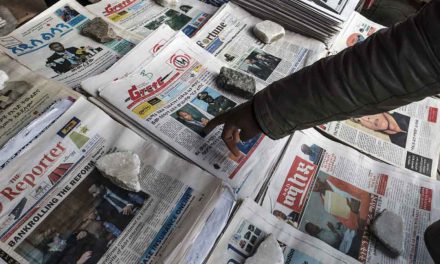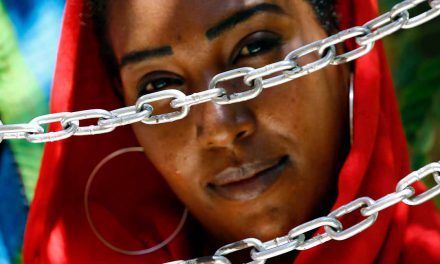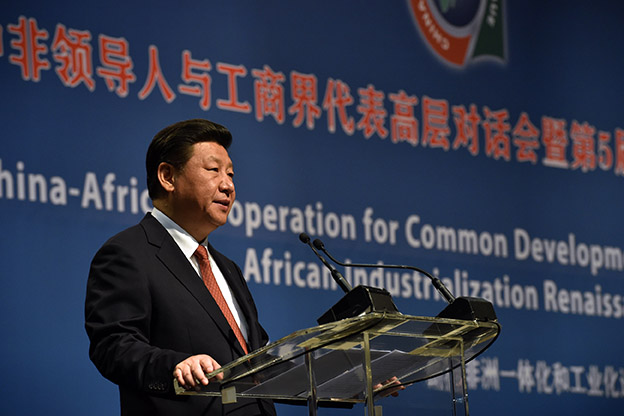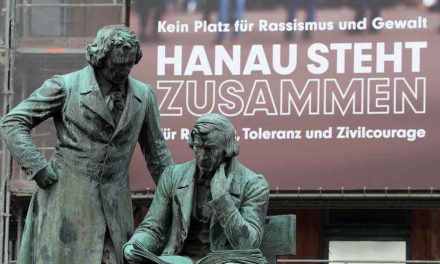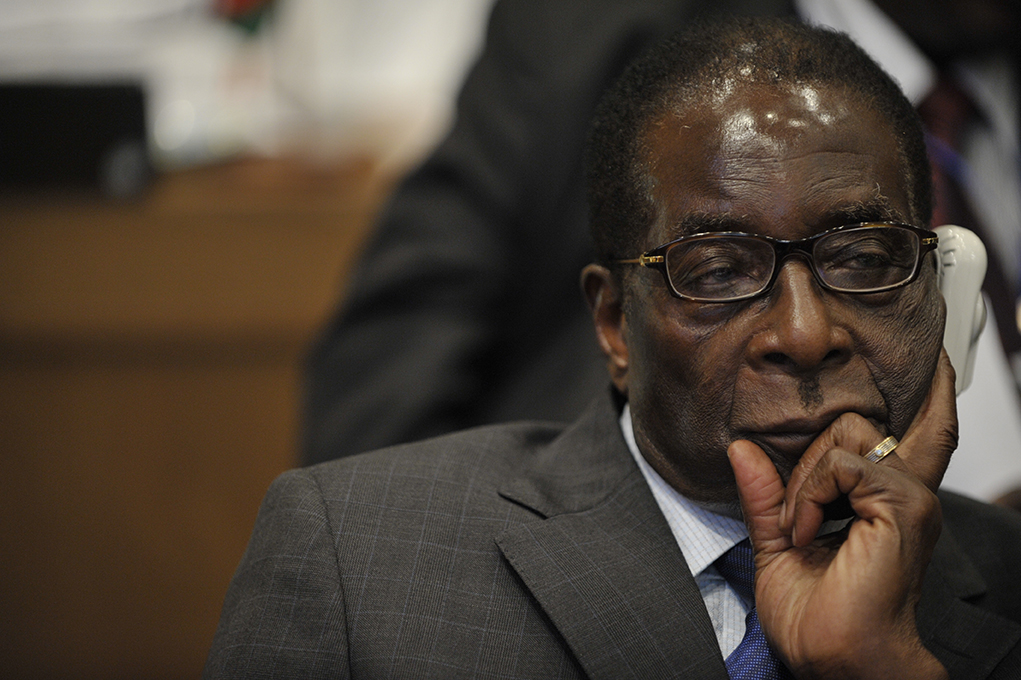
Robert Mugabe, president of Zimbabwe, attending the 12th African Union Summit in 2009 in Addis Ababa, Ethiopia. (U.S. Navy photo by Mass Communication Specialist 2nd Class Jesse B. Awalt/Released)
Unhappiness between former liberation parties continues to bedevil Zimbabwean politics
Zimbabwe has two main ethnic groups, the Shona and the Ndebele, as well as smaller groups such as the Tonga, Kalanga, Venda, Ndau and Xhosa. The Shona, which constitutes a majority, includes three main sub-groups, the Zezuru, Karanga and Manyika. These groups have historically contested for power since the liberation struggle. Meanwhile, the Ndebele and other groups complain that they have been marginalised.
On July 15 this year Zimbabwe’s main opposition Movement for Democratic Change (MDC-T), headed by Morgan Tsvangirai, appointed two vice-presidents from the Karanga group, Nelson Chamisa and Elias Mudzuri, both from Masvingo province. Some party officials accused him of playing the tribal card. Supporters of Thokozani Khupe, an Ndebele, viewed the appointments as an attempt to ensure that an Ndebele person does not rise to the party presidency.
Members of Shona groups also questioned the appointments. Some female members of the party said Tsvangirai’s move undermined the advancement of women in politics.
The MDC-T leader told the media that ethnicity and gender considerations had nothing to do with the party’s objectives, and that raising such questions was “very divisive”.
Yet questions continued to be asked, prompting his spokesperson, Luke Tamborinyoka, to clarify the issue. Tsvangirai “did not care where people come from”. he said. “He looks at the
job that needs to be done and your capacities.” That explanation failed to douse the flames, and four days later Tamborinyoka had to issue another statement. “It d[oes] not matter where the cats came from, as long as they catch the mice,” he said.
According to Professor Eldred Masunungure, a political scientist at the University of Zimbabwe, Tsvangirai’s appointments represent a failure to respect the important principle of ethnic identity in Zimbabwe. “In Zimbabwe, like many other places, ethnicity is a salient aspect of political and social life,” Masunungure said. “Members of political parties want
… their ethnic groups represented in the higher echelons and not just at the base of the party.”
The ruling party, the Zimbabwe African National Union-Patriotic Front (Zanu-PF), whose 92-year-old leader, Robert Mugabe is a Zezuru, has been in power since independence in 1980. It has also struggled to balance ethnic contradictions.
Because Mugabe has been in power for so long, many party officials are of the view that the next president should be not be a Zezuru.
Mugabe’s deputy, Emmerson Mnangagwa, a Karanga from the Midlands province, is seen as a front runner in the succession race; but a faction around First Lady Grace Mugabe, which has the support of Vice-President Phelekezela Mphoko, is trying to derail his ambitions. In February Mphoko caused a storm when he said a Karanga was not guaranteed to succeed Mugabe. The predominantly Zezuru crowd at a rally in Chiweshe, Mashonaland Central province, applauded wildly. Struggle veterans, and Mugabe himself, were critical of Mphoko, saying he was “promoting tribalism”.
Ahead of Zanu-PF’s congress in 2004 some party officials suggested that senior positions should be rotated along ethnic lines in what is now known as the Tsholotsho Declaration. Mugabe and his supporters, however, claimed the architects of the Tsholotsho Declaration, including Professor Jonathan Moyo, were mounting a coup, and several officials were suspended.
However, in December 2004, Moyo said the Tsholotsho Declaration aimed to promote national cohesion, and that the senior party leadership “should reflect Zimbabwe’s regional diversity and ethnic balance between and among the country’s four major ethnic groupings, namely Karanga, Manyika, Zezuru and Ndebele”. The declaration was a result of an internal investigation into the party’s poor performance in the 2000 election, he said.
The aim was to transform Zanu-PF “from a party of the past based on patronage and arbitrary rule by the old guard led by President Mugabe, and dominated by one ethnic grouping, to a modern party based on democracy, merit and the rule of law”.
Political analyst Dr Ibbo Mandaza says Zimbabwe’s ethnicities have their origins in the anti-colonial nationalist politics which began as an alliance of representatives of “tribal” groups. “The irony is that you come into the nationalist alliance as a representative of [your] tribe, [but] you are then supposed to lose this ‘tribal’ identity,” said Mandaza. “But if things get bad or unfavourable, you go back to it and you use it to your advantage.”
Zimbabwe had two liberation movements, the Zimbabwe African People’s Union (ZAPU), formed in 1961, and the Zimbabwe African National Union (ZANU) whose leaders split
from ZAPU in 1963. ZAPU was mainly an Ndebele organisation; ZANU was predominantly Shona. “While the two Zimbabwean liberation movements were not entirely ethnically based, as each continued to have some leaders from each of the two major ethnic groups, they were essentially ethnically . based in terms of general membership,” Professor Alois Mlambo of the University of Pretoria wrote in a 2013 article.
Even within ZANU there was stiff intra-Shona competition, as detailed in Professor Masipula Sithole’s 1999 book “Struggles Within the Struggle (1957- 1980)”. ZANU’s wartime chairman Herbert Chitepo, a Manyika, was a victim of a Zezuru-Karanga conspiracy to remove the Manyika from positions of power and influence, he argues. Chitepo was assassinated in Lusaka, Zambia, in 1975.
Sithole claims his brother, Ndabaningi Sithole, the founding president of ZANU, suffered a similar fate, resulting in the elevation of Mugabe. Sithole was deposed by
the ZANU leadership in 1975 after accusations that he had abandoned the struggle to pursue personal interests.
The Manyikas’ home province, Manicaland, has since been a hotbed of rebellion against Mugabe. Sithole went on to form his own party, ZANU- Ndonga. Former ZANU secretary general, Edgar Tekere, a Manyika, broke away to form the Zimbabwe Unity Movement, while Simba Makoni, a former Zanu-PF politburo member from Manicaland, stood against Mugabe in 2008. Tsvangirai
is from Buhera in Manicaland, while former Movement for Democratic Change leader, Arthur Mutambara, also hails from Manicaland.
Zimbabwe’s first democratic elections in 1980 also held ethnic undertones. Mugabe and ZANU recorded landslide victories in the Shona-dominated provinces of Manicaland, Mashonaland Central, Mashonaland West and Masvingo, and won the election; but Joshua Nkomo’s ZAPU won majority seats in the Matabeleland provinces dominated by the Ndebele.
ZAPU was “national in outlook” but “lost the propaganda war and ultimately the elections because of the tribalisation of politics by Mugabe’s ZANU”, says political commentator Dumisani Nkomo, Nkomo’s nephew.
Two years after independence, the ZAPU-ZANU conflict escalated when Mugabe accused ZAPU’s leadership of arming bandits. From 1983 security forces massacred about 20,000 civilians in the Matabeleland and Midlands provinces. The killings only ceased in 1987 after Nkomo and Mugabe signed the Unity Accord which saw the two parties merging into one, Zanu-PF.
For ethnic balancing Mugabe appointed Nkomo as vice-president, joining Simon Muzenda, who was already a deputy.
After Nkomo’s death in 1999 Mugabe appointed Joseph Msika, John Nkomo and Mphoko, all of whom had previously served in ZAPU. Other political parties have followed this model and generally appoint a Shona and an Ndebele person in the top two positions.
However, the Unity Accord failed to dispel tensions. As Mlambo notes, “the massacre of the Ndebele citizens … had sown seeds of deep resentment among some Ndebeles, not just against the ruling Zanu-PF government, but against the Shona people in general”.
Ultimately this resulted in the revival of ZAPU by Dumiso Dabengwa, a former military commander in Nkomo’s guerrilla army, the Zimbabwe People’s Revolutionary Army. ZAPU is one of several opposition parties working towards establishing a grand coalition to challenge Mugabe and Zanu-PF in the 2018 general elections. An Ndebele ethno-nationalist movement calling itself the Mthwakazi Liberation Front (MLF) has emerged and is advocating for the establishment of an independent Ndebele state.
“ZAPU was national in outlook but lost the propaganda war and ultimately the elections because of the tribalisation of politics by Mugabe’s ZANU.”
In 2011 MLF leaders Paul Siwela and John Gazi were charged with treason and subverting a constitutionally elected government. Siwela fled the country in 2013 before the High Court passed judgment on the case. Gazi was acquitted.
“The arrest of MLF leaders instilled fear in people who supported MLF because the impression that was given is that advocating for secession is illegal and attracts the wrath of the authorities,” said Nkomo, the political commentator.
He added that the people of Matabelelandwould also prefer “something more achievable and practical”, such as the devolution of power.


